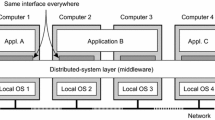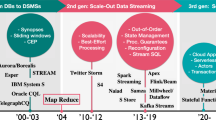Abstract
Time-triggered architecture, as a mainstream design of the distributed real-time system, has been successfully applied in the aerospace, automotive and mechanical industries. However, time-triggered scheduling is a challenging NP-hard problem. There are few studies that could quickly solve the scheduling problem of large distributed time-triggered systems. To solve this problem, a communication affinity parameter is defined in this paper to describe the degree of bias of the shaper task towards sending or receiving messages. Based on this, an innovative task-message decoupling model named D-scheduler is built to reduce the computation complexity of the scheduling problem in large-scale systems. Additionally, we provide mathematical proof that our model is a convex optimization that is easy to solve with existing computational tools. Our experiments substantiate the efficacy of the D-scheduler. It dramatically reduces the scheduling complexity of large-scale real-time systems with a small loss of solving space compared to the federal scheduler.
Similar content being viewed by others
References
Yang T T, Tong C. Real-time detection network for tiny traffic sign using multi-scale attention module. Sci China Tech Sci, 2022, 65: 396–406
Tong C, Yin X, Li J, et al. A shilling attack detector based on convolutional neural network for collaborative recommender system in social aware network. Comput J, 2018, 61: 949–958
Ye W, Tang T F, Li Q C. Robotized manufacturing equipment: A review from the perspective of mechanism topology. Sci China Tech Sci, 2023, 66: 1683–1697
Chen C, Wang Y, Gao Z T, et al. Intelligent learning model-based skill learning and strategy optimization in robot grinding and polishing. Sci China Tech Sci, 2022, 65: 1957–1974
Zheng Z, Zhang K T, Gao X Q. Human-cyber-physical system for production and operation decision optimization in smart steel plants. Sci China Tech Sci, 2022, 65: 247–260
Kopetz H. Real-time Systems: Design Principles for Distributed Embedded Applications. New York: Springer, 2011
Burke E K, Kendall G. Search Methodologies: Introductory Tutorials in Optimization and Decision Support Techniques. Springer Publishing Company, 2013
Craciunas S S, Oliver R S. Combined task- and network-level scheduling for distributed time-triggered systems. Real-Time Syst, 2016, 52: 161–200
Kopetz H, Bauer G. The time-triggered architecture. Proc IEEE, 2003, 91: 112–126
Steiner W. An evaluation of smt-based schedule synthesis for time-triggered multi-hop networks. In: 31st IEEE Real-time Systems Symposium. San Diego, 2010
De Moura L, Bjorner N. Z3: An efficient smt solver. In: Ramakrishnan C R, Rehof J, eds. Tools and Algorithms for the Construction and Analysis of Systems. TACAS 2008. Lecture Notes in Computer Science, vol 4963. Berlin, Heidelberg: Springer, 2008
Yices. An smt solver. http://yices.csl.sri.com
Gurobi Optimization Inc. Gurobi optimizer reference manual. 2014
IIBM ILOG Cplex. V12. 1: User’s manual for CPLEX. New York: International Business Machines Corporation, 2009
Steiner W. Synthesis of static communication schedules for mixed-criticality systems. In: 2011 14th IEEE International Symposium on Object/Component/Service-Oriented Real-Time Distributed Computing Workshops. Newport Beach: IEEE, 2011. 11–18
Tamasselicean D, Pop P, Steiner W. Synthesis of communication schedules for ttethernet-based mixed-criticality systems. In: Proceedings of the Eighth IEEE/ACM/IFIP International Conference on Hardware/Software Codesign and System Synthesis. Finland, 2012. 473–482
Al Sheikh A, Brun O, Chéramy M, et al. Optimal design of virtual links in AFDX networks. Real-Time Syst, 2013, 49: 308–336
Roy S K, Devaraj R, Sarkar A, et al. Contention-aware optimal scheduling of real-time precedence-constrained task graphs on heterogeneous distributed systems. J Syst Architecture, 2020, 105: 101706
Hanzalek Z, Burget P, Sucha P. Profinet IO IRT message scheduling with temporal constraints. IEEE Trans Ind Inf, 2010, 6: 369–380
Huang J, Blech J O, Raabe A, et al. Static scheduling of a time-triggered network-on-chip based on SMT solving. In: Design, Automation & Test in Europe Conference & Exhibition. Dresden, 2012
Scholer C, Krenzbaath R, Murshed A, et al. Computing optimal communication schedules for time-triggered networks using an SMT solver. In: 2016 11th IEEE Symposium on Industrial Embedded Systems. Krakow, 2016. 1–9
Pahlevan M, Tabassam N, Obermaisser R. Heuristic list scheduler for time triggered traffic in time sensitive networks. SIGBED Rev, 2019, 16: 15–20
Pang Z, Huang X, Li Z, et al. Flow scheduling for conflict-free network updates in time-sensitive software-defined networks. IEEE Trans Ind Inf, 2020, 17: 1668–1678
Yu Q, Gu M. Adaptive group routing and scheduling in multicast timesensitive networks. IEEE Access, 2020, 8: 37855–37865
Zhou Y, Samii S, Eles P, et al. Time-triggered scheduling for timesensitive networking with preemption. In: 2022 27th Asia and South Pacific Design Automation Conference (ASP-DAC). Taipei, 2022. 262–267
Ojewale M A, Yomsi P M, Nikolic B. Multi-level preemption in TSN: Feasibility and requirements analysis. In: 23rd International Symposium on Real-Time Distributed Computing. Nashville, 2020. 47–55
Ojewale M A, Yomsi P M, Nikolic B. Worst-case traversal time analysis of TSN with multi-level preemption. J Syst Architecture, 2021, 116: 102079
Ashjaei M, Sjödin M, Mubeen S. A novel frame preemption model in TSN networks. J Syst Architecture, 2021, 116: 102037
Oliver R S, Craciunas S S, Steiner W. IEEE 802.1Qbv gate control list synthesis using array theory encoding. In: 2018 IEEE Real-Time and Embedded Technology and Applications Symposium. Porto, 2018. 11–13
Zhang L, Goswami D, Schneider R, et al. Task- and network-level schedule co-synthesis of ethernet-based time-triggered systems. In: 19th Asia and South Pacific Design Automation Conference. Singapore, 2014. 119–124
Satish N, Ravindran K, Keutzer K. A decomposition-based constraint optimization approach for statically scheduling task graphs with communication delays to multiprocessors. In: Design, Automation & Test in Europe Conference & Exhibition. Nice, 2007. 57–62
Zeng H, Zheng W, Di Natale M, et al. Scheduling the flexray bus using optimization techniques. In: Proceedings of the 46th Design Automation Conference, DAC 2009. San Francisco, 2009
Pozo F, Rodrigueznavas G, Hansson H, et al. SMT-based synthesis of ttethernet schedules: A performance study. In: 10th IEEE International Symposium on Industrial Embedded Systems. Francisco Pozo, 2015. 162–165
Tamas-Selicean D, Pop P. Design optimization of mixed-criticality real-time applications on cost-constrained partitioned architectures. In: 2011 IEEE 32nd Real-Time Systems Symposium. Vienna, 2011. 24–33
Burns A, Davis R. Mixed criticality systems: A review. Technical Report. Department of Computer Science, University of York, 2013. 1–69
Tamas-Selicean D, Pop P, Steiner W. Design optimization of ttethernet-based distributed real-time systems. Real-Time Syst, 2015, 51: 1–35
Gavrilut V, Zarrin B, Pop P, et al. Fault-tolerant topology and routing synthesis for IEEE time-sensitive networking. In: Proceedings of the 25th International Conference on Real-Time Networks and Systems. Grenoble, 2017. 267–276
Senapati D, Sarkar A, Karfa C. HMDS: A makespan minimizing DAG scheduler for heterogeneous distributed systems. ACM Trans Embed Comput Syst, 2021, 20: 1–26
Oliver R S, Craciunas S S, Ecker V. Optimal static scheduling of realtime tasks on distributed time-triggered networked systems. In: Proceedings of the 2014 IEEE Emerging Technology and Factory Automation. Barcelona, 2014
Liu C L, Layland J W. Scheduling algorithms for multiprogramming in a hard-real-time environment. J ACM, 1973, 20: 46–61
Kohútka L, Stopjaková V. Novel efficient on-chip task scheduler for multi-core hard real-time systems. Microprocess Microsyst, 2020, 76: 103083
Kohútka L. A new FPGA-based architecture of task scheduler with support of periodic real-time tasks. In: 29th International Conference on Mixed Design of Integrated Circuits and System (MIXDES). Wroclaw, 2022. 77–82
Kohútka L. Scheduling periodic real-time tasks with inter-task synchronisation. In: 2022 11th Mediterranean Conference on Embedded Computing (MECO). Budva, 2022. 1–4
Syed A, Fohler G. Efficient offline scheduling of task-sets with complex constraints on large distributed time-triggered systems. Real-Time Syst, 2019, 55: 209–247
Pellizzoni R, Lipari G. Feasibility analysis of real-time periodic tasks with offsets. Real-Time Syst, 2005, 30: 105–128
Kraft D. A software package for sequential quadratic programming. Forschungsbericht- Deutsche Forschungs- und Versuchsanstalt fur Luft- und Raumfahrt, 1988
Powell M J D. A direct search optimization method that models the objective and constraint functions by linear interpolation. In: Gomez S, Hennart J P, eds. Advances in Optimization and Numerical Analysis, vol 275. Dordrecht: Springer, 1994
Byrd R H, Hribar M E, Nocedal J. An interior point algorithm for large-scale nonlinear programming. SIAM J Optim, 1999, 9: 877–900
Byrd R H, Lu P, Nocedal J, et al. A limited memory algorithm for bound constrained optimization. SIAM J Sci Comput, 1995, 16: 1190–1208
Lalee M, Nocedal J, Plantenga T. On the Implementation of an algorithm for large-scale equality constrained optimization. SIAM J Optim, 1998, 8: 682–706
Beal L, Hill D, Martin R, et al. GEKKO optimization suite. Processes, 2018, 6: 106
Author information
Authors and Affiliations
Corresponding author
Additional information
This work was partially supported by the National Natural Science Foundation of China (Grant Nos. 62176016 and 72274127), the National Key R&D Program of China (Grant No. 2021YFB2104800), Guizhou Province Science and Technology Project: Research and Demonstration of Sci. Tech Big Data Mining Technology Based on Knowledge Graph (supported by Qiankehe[2021] General 382), Teaching Reform Project of Beihang University in 2020: Standardized Teaching and Intelligent Analysis System Construction for Production Practice, Capital Health Development Research Project (Grant No. 2022-2-2013), and the Young Talent Development Grant of Beijing Economic-Technological Development Area (Grant No. 2140030001870).
Rights and permissions
About this article
Cite this article
Yang, T., Zhang, Y., Yue, F. et al. D-scheduler: A scheduler in time-triggered distributed system through decoupling dependencies between tasks and messages. Sci. China Technol. Sci. 67, 183–196 (2024). https://doi.org/10.1007/s11431-023-2492-8
Received:
Accepted:
Published:
Issue Date:
DOI: https://doi.org/10.1007/s11431-023-2492-8




